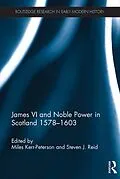James VI and Noble Power in Scotland explores how Scotland was governed in the late sixteenth century by examining the dynamic between King James and his nobles from the end of his formal minority until his accession to the English throne in 1603. It includes case studies from across Scotland from the Highlands to the Borders and burghs, and on major individual events such as the famous Gowrie conspiracy. It is demonstrated that King James was a competent and successful manager of his kingdom who demanded a new level of obedience as a 'universal king'. This volume offers students of Stuart Britain a fresh and valuable perspective on James and his reign.
Autorentext
Miles Kerr-Peterson was recently awarded a PhD in history at the University of Glasgow, his thesis being a study of the life and lordship of George Keith, fourth Earl Marischal. His research focuses on early modern Scottish noble and academic cultures.
Steven J. Reid is Senior Lecturer in History at the University of Glasgow. His previous publications include Humanism and Calvinism: Andrew Melville and the Universities of Scotland, c.1560-c.1625 (2011).
Zusammenfassung
James VI and Noble Power in Scotland explores how Scotland was governed in the late sixteenth century by examining the dynamic between King James and his nobles from the end of his formal minority in 1578 until his accession to the English throne in 1603. a The collection assesses James' relationship with his nobility, detailing how he interacted with them, and how they fought, co-operated with and understood each other. It includes case studies from across Scotland from the Highlands to the Borders and burghs, and on major individual events such as the famous Gowrie conspiracy. Themes such as the nature of government in Scotland and religion as a shaper of policy and faction are addressed, as well as broader perspectives on the British and European nobility, bloodfeuds, and state-building in the early modern period. a The ten chapters together challenge well-established notions that James aimed to be a modern, centralising monarch seeking to curb the traditional structures of power, and that the period represented a period of crisis for the traditional and unrestrained culture of feuding nobility. It is demonstrated that King James was a competent and successful manager of his kingdom who demanded a new level of obedience as a 'universal king'. This volume offers students of Stuart Britain a fresh and valuable perspective on James and his reign.
Inhalt
Introduction
Miles Kerr-Peterson
- James VI and James Douglas, Earl of Morton
- Of Bairns and Bearded Men: James VI and the Ruthven Raid
- Friendship, Politics and Religion: George Gordon, Sixth Earl of Huntly and King James VI, 1581-1595
- James VI, Noble Power and the burgh of Glasgow, c. 1580-1605
- He "made them friends in his cabinet": James VI's suppression of the Scott-Ker feud
- Noble Power in the West Highlands and Isles: James VI and the End of the Mercenary Trade with Ireland, 1594-6
- Rise of a Courtier: the second Duke of Lennox and strategies of Noble Power under James VI
- 'For the King Favours Them Very Strangely': The Rise of James VI's Chamber, 1580-1603
- The Octavians
- The Gowrie Conspiracy: do we need to wait until the Day of Judgement?
Amy Blakeway
Steven J. Reid
Ruth Grant
Paul Goatman
Anna Groundwater
Ross Crawford
Adrienne McLaughlin
Amy L. Juhala
Julian Goodare
Jenny Wormald
